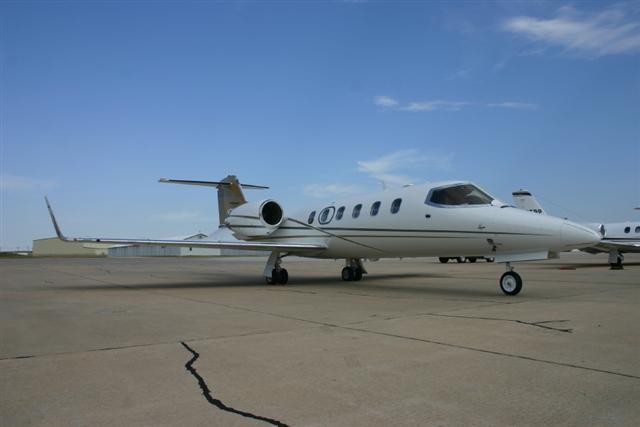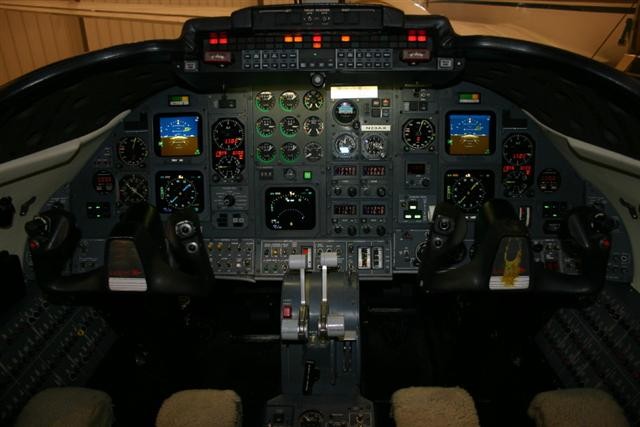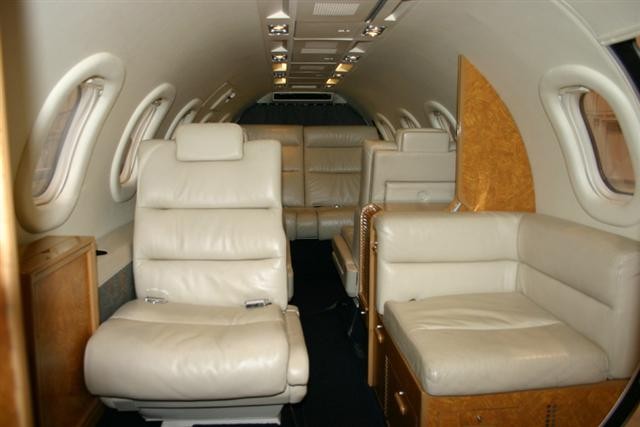


Aircraft Description
Background/History
The Learjet 31A is one of the more recent developments in the long line of aircraft descended from Bill Lear’s original Lear 23, which first flew in October 1963. While all of the 20-series Learjets were powered by turbojet engines, the current generation of turbofan-powered Learjets began in 1973 with the first flight of the model 35. Subsequent developments included the models 36, 55, and 60. The Learjet 31, introduced in 1988, combined the winglet-equipped airfoil of the model 55 with the area-ruled fuselage and powerplants of the 35/36, and employed delta strakes beneath the tail section. The Learjet 31A was announced at the 1990 NBAA convention. This latest model features systems improvements, including updated avionics with a five-tube EFIS, and a digital steer-by-wire nosewheel system. The Learjet 31A received FAA certification in July 1991 with production and deliveries beginning that year. 208 31As had been delivered by program end in 2002.
Power
The Learjet 31A is powered by a pair of AlliedSignal TFE 731-2-4-3B turbofans rated at 3,500 lbs. of thrust each at ISA + 5C. Inspection interval on the engines is 4,200 hours.
Avionics
The Learjet 31A is equipped with a Bendix/King KFC-3100 dual digital autopilot/flight director system, five-screen EFIS, dual KDC 481 air data computers, dual Series III VC-401B VHF transceivers, dual MST 67A Mode S transponders, Series III DFS-43 ADF, DM-441 DME, KRA-405 radar altimeter, and a Universal Navigation UNS-1 FMS. Optional equipment includes HF comms, Category II flight director, microwave landing system, ground proximity warning system, and the Global Wulfsberg GNS-X FMS.
Design Features
The Learjet 31A is a medium-range, twin turbofan-powered business aircraft configured as a cantilever low-wing monoplane with slight leading-edge sweep and cantilever T-tail. The retractable tricycle landing gear is fitted with dual wheels on each main gear unit and a single nosewheel. Nosewheel steering is now accomplished through a digital steer-by-wire system. The fuselage is area-ruled and incorporates angled strakes on the lower tail section for enhanced yaw stability. The wing retains the drag-reducing winglets of the earlier “Longhorn” Learjet models. A trim stabilizer augmentation system has been added and allows an increase in Vne and Mmo over the earlier 31 model.
Accomodations
The Learjet 31A is a medium-sized business jet normally configured for seven or eight passengers. The typical arrangement consists of a full-width aft divan, and a club including with an individual side-facing seat forward of the club and opposite the entry door. The refreshment cabinet is on the port side just forward of the door. Baggage stowage is aft of the rear fold-down seat and accessable only from inside the cabin. Internal cabin height is 4.4ft., width is 4.9ft. and length is 17.1ft.
| General | Learjet 31A, LR-31A | |||
|---|---|---|---|---|
| Category | Jet < 20,000 lbs. | |||
| Years Aircraft Manufactured | 1991 – 2002 | |||
| Serial Number Range | 035-242 | |||
| Retail High Price | $2,250,000.00 / 1,765,575.00€ | |||
| Retail Low Price | $995,000.00 / 780,776.50€ | |||
| Characteristics | Learjet 31A, LR-31A | |||
| Seating | 2 + 6/10 | |||
| Wing Loading | 64.3 | |||
| Power Loading | 2.4 | |||
| Noise(EPNdB): Takeoff/Sideline/Approach | 81.9/86.9/92.8 | |||
| External Dimensions (ft) | Learjet 31A, LR-31A | |||
| External Length | 48.7 | |||
| External Height | 12.3 | |||
| External Span | 43.8 | |||
| Internal Dimensions (ft) | Learjet 31A, LR-31A | |||
| Internal Length (Overall/Net Height) | 17.1/13.5 | |||
| Internal Height | 4.4 | |||
| Internal Width (Max/Floor) | 4.9/3.0 | |||
| Baggage | Learjet 31A, LR-31A | |||
| External: Cu.Ft./Lb. | 40/500 | |||
| External: Cu.Ft./Lb. | N/A | |||
| Power | Learjet 31A, LR-31A | |||
| Engines | 2 Hon TFE731-2-4-3B | |||
| Output (lbs ea.)/Flat Rating | 3,500/ISA+5 | |||
| Inspection Interval | 4,200c | |||
| Data based on latest manufactured year | ||||



